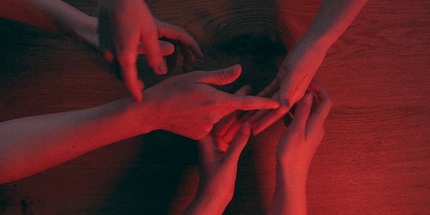
Guide
A trip to the sexologist
by Natalie Hemengül

Our thoughts have power. Power you can use to your advantage in the bedroom. But how exactly does fantasising work? And just how much do these fantasies have in common with reality?
Sexual fantasy. It’s rarely a fully developed story with a plotline you can play out from A to Z in your head. Sometimes it’s just a feeling. A memento of moments gone by. A blurry image or nothing but a scent.
Sexual fantasies come in many shapes and sizes, but they have one thing in common: they’re the sparks that light our fire. «Fantasies can spark arousal as they interact with your body,» says sex therapist Dania Schiftan. According to Schiftan, the excitement that arises in the head is transmitted to the body like an echo. But toned down. «It’s comparable to the thrill of anticipation. When you think of a future event you’re looking forward to, your body gets warmer and begins to tingle. The same thing happens when you turn on the big screen in your head. You engross yourself in something, and your body reacts to those thoughts. And it also works the other way around, by the way.» So arousal is no accident. You can use your imagination to jump-start your desire. «Especially for women, sexual fantasy is a helpful tool to create desire when there is none. Or to increase existing desire,» Schiftan explains.
Fantasies are manifold. According to Schiftan, people can be attracted to many things. This holds true even in monogamous relationships. «The likelihood of a partner covering the full range of what the other person wants is small. And as far as I’m concerned, they don’t have to. Fantasies are a way to add aspects that lie outside of a monogamous partnership to the couple’s sexuality.» But such fantasies can cause the other partner to fear that these are desires they want to experience in real life. «This is why some people are ashamed of – or even disgusted by – their own fantasies.» And yet according to Schiftan, fantasies neither provide information about what a person really wants to experience nor about their character.
So how does fantasy relate to reality?

«There’s a discrepancy between fantasy and reality. This means that fantasies can’t immediately be equated with repressed desires. What’s exciting in your head isn’t necessarily exciting in real life,» explains Schiftan. For example, a woman fantasising about sex with other women doesn’t necessarily mean she’s attracted to women in real life. «While such fantasies may be an indication of same-sex attraction – which you’re welcome to explore – they may just as easily be a woman’s way of eroticising the female sex through self-exploration.» So there’s a distinction between fantasy and reality, but they do still go hand in hand. But the connection is evidently not where we’d expect it.
«What a person fantasises about also depends on how they get themselves aroused in real life,» says Schiftan. This means that the technique used in masturbation also guides your fantasy. «For example, if you’re aroused by intense pressure and friction, you’re very likely to imagine an intense scene involving rough touching, bondage, or the like.» In this case, what pleases you physically is indirectly transferred to your imagination. Conversely, fantasies can also be changed by altering the technique or setting when you masturbate.
«Fantasies should, first and foremost, be enjoyed and valued. Whether you really want to turn a fantasy into reality or just enjoy it in your head is something you can figure out for yourself in no hurry.»
Fantasy can fuel the flames in sexuality. But what if even your fantasy needs a little push? «In addition to self-authored scenarios, porn and erotic literature, as well as audio tracks, can also serve as a source of inspiration, as long as you don’t use them compulsively to create arousal,» Schiftan says.
Such tools are particularly demanding on the imagination. «Because the focus is in the mind instead of on the body, the arousal only transfers to the sexual organ to a limited extent.» Keyword: echo. «This is why it can make perfect sense to only use these tools to light the initial spark and then put them away. Or the other way around: if you tend to struggle to stay aroused, you can turn to porn, erotic literature and the like as an aid.»

Issues arise when arousal is solely dependent on a specific fantasy or when it’s prone to sudden interruption. «One 'wrong' move by the partner becomes enough to end arousal.» This then causes you to snap out of your fantasy because your counterpart isn’t living up to the role you imagined – because not everything is happening exactly as you imagined. «For arousal stemming from fantasy to be sustainable, we need to include our sex organs in it.» Think of it as a kind of ping-pong between the head and body – the fantasy in your head initiates the desire and your body responds to it. This physical response is what you should focus on. «If, on the other hand, the focus remains in the head, the arousal subsides with the slightest distraction.»
There’s something else that has a negative effect on pleasure: everyday thoughts. Did I hang up the laundry? Should I postpone my haircut after all? While distracting thoughts like this have nothing to do with eroticism, they do play a crucial role in how much – and whether – you can enjoy your physical arousal.
In order to appreciate the exciting physical sensations, you need to turn off your brain. «If you find this difficult, breathing, touching and concentration exercises can help bring your focus back to your body and the here and now.» The goal is to start feeling and appreciating what’s happening in your body again. Where do you feel arousal? Where are your partner’s hands right now? According to Schiftan, it’s normal for your thoughts to wander and arousal to subside intermittently. «The important thing is just to keep trying to get back to physical mindfulness.» Practice makes perfect.
This is the sixth article in a series on sexuality with Dania Schiftan. If you have any questions or points you want us to cover in the coming articles, let me know by e-mail(mailto:natalie.hemenguel@digitecgalaxus.ch) or in the comments below.
For the last 13 years, Dania Schiftan has been working as a sexologist and psychotherapist from her own practice in Zurich. You can find out more about Dania and her job in this interview:
All other articles in this series are here:
As a massive Disney fan, I see the world through rose-tinted glasses. I worship series from the 90s and consider mermaids a religion. When I’m not dancing in glitter rain, I’m either hanging out at pyjama parties or sitting at my make-up table. P.S. I love you, bacon, garlic and onions.
Practical solutions for everyday problems with technology, household hacks and much more.
Show all